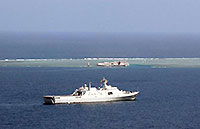Japan's defense budget plan concerns neighbors
By ZHANG YUNBI (China Daily) Updated: 2013-01-08 02:35Tokyo's plan to increase its defense budget for the first time in a decade has concerned its Asian neighbors.
Observers warned that a hike in defense spending is in keeping with the unwavering intention of the new Japanese cabinet to maintain a tough position on Japan's territorial disputes, which in turn may lead to escalating tensions in the region.
Japanese Defense Minister Itsunori Onodera confirmed the government's plan to increase the 2013 annual defense budget on Sunday, while speaking on a program on Japan's NHK Television.
The minister said the country had been slashing spending on its armed forces for years, yet "neighboring countries are adding to their defense budgets".
Japan's Jiji Press News Agency said Shinzo Abe, the hawkish new Japanese prime minister who won a landslide election victory at the end of 2012, has based his budget policy on plans to rein in China's patrol of the waters off the Diaoyu Islands, which have belonged to China for centuries.
Wang Ping, a researcher in Japanese studies at the Chinese Academy of Social Sciences, said removing obstacles that confine Japan's military expansion is a key ambition of the Tokyo government, which is heading toward its goal "step by step". Japan has decided to increase defense spending to at least around 4.77 trillion yen ($54.3 billion), Kyodo News Agency quoted sources on Saturday as saying.
The country's defense spending peaked in the initial budget for fiscal 2002 at 4.96 trillion yen, and as the figures continued to drop in the following years, the initial budget for fiscal 2012 was 4.71 trillion yen.
Abe, who is also president of the ruling conservative Democratic Party of Japan, is now "putting his right-wing election campaign into practice", Seoul's Chosun Ilbo newspaper warned on Monday.
In August 2012, Tokyo also experienced a diplomatic deadlock with Seoul after Lee Myung-bak, outgoing South Korean president, visited disputed islands, which Seoul calls Dokdo and Tokyo calls Takeshima.







